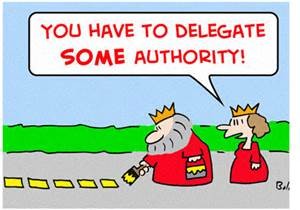Fess up: Do you delegate or drop-off?
Dropping-off. We ask others to do stuff for us all the time – stuff we don’t want to do, don’t have the time to do, and couldn’t do even if we had the time. We drop our suits off for pressing (a task we can’t do), our car for an oil change (a task we don’t have time to do), and our children for learning chemistry (a task we don’t know how to do).
We drop off, move on, and don’t think about what we dropped off until we pick it up later. Dropping off, appropriate at times, is not delegating.
 Right reasons – wrong outcome. Let’s own up to why you and I don’t delegate. We say… (1) I’m used to doing it. (2) It’s easier for me to do it. (3) It takes too long to explain to someone what I want. (4) I don’t think they’ll do it right and I’ll probably have to do it over anyway. (5) I don’t want to ask someone to do it because I already don’t like doing it and why would I have them do something I think is unsavory?
Right reasons – wrong outcome. Let’s own up to why you and I don’t delegate. We say… (1) I’m used to doing it. (2) It’s easier for me to do it. (3) It takes too long to explain to someone what I want. (4) I don’t think they’ll do it right and I’ll probably have to do it over anyway. (5) I don’t want to ask someone to do it because I already don’t like doing it and why would I have them do something I think is unsavory?
These are the right reasons for someone whose role does not include developing others. Because a leader’s role is to develop people, being an effective delegator is essential.
I consider dropping off a transactional conversation and effective delegating a transformational conversation. A transactional conversation is swiping my credit card at the gas pump. There’s no relationship – it’s just plastic to machine. A transformational conversation requires a commitment to the relationship. (Sidebar: True, some person-to-person interactions are transactional, yet even a sincere “good morning” or “thank you” has the possibility of transforming the giver and the received.)
Delegating. Effective delegation requires a partnership. It is the intentional act of giving someone the power and support to do something that you are accountable for. When we delegate, we ask the person to think, act and produce a result.
Right Commitment. Being an effective delegator – meaning: the task you delegated gets done to your satisfaction – is not about getting your stuff done by others. It’s about building the capacity of others. As with any developmental process, effective delegation takes time and requires understanding what it takes for someone to act and think from your perspective. It takes a commitment to build leaders around you.
I’ve expanded Susan M. Heathfield’s (an about.com guide) take on this topic.
Before you delegate, determine your intention.
- Tactical: You’ve chosen someone because they will get the task done, perhaps with little or no supervision. You could call this a “favor” task.
- Developmental: You’ve picked someone because you want them to experience an accountability they’re likely to have in their career path they’ve chosen.
- Strategic: You picked the person with the intention that the person take on the accountability.
The conversation increases in context and content as you move from tactical to strategic delegation. The trust in the relationship is increasingly put on the line, too.
7 Steps to Effective Delegation
- Why me? Tell the person why you chose them. What’s in it for them?
- Give them the whole task. If you can’t give them the whole task, give them the whole picture so they can see how their part contributes to the whole.
- Be clear about (a) what you want them to do, what the outcome should look like; (b) a “how to” if it is relevant for success, including if you need to know progress, specify what you need to know and by when.
- Share what you know that works. If you foresee potential bumps in the road, give them a heads up, tell them what they can do if encountered.
- Create a structure for success: (a) Ask them what support they need and provide it; (b) Connect with others they can contact for support; tell the support people who will be acting on your behalf. Do not leave it to the delegate to make this connection; (c) Be available.
- Thank them appropriately (personally, publically) when task is done. If this is a tactical delegation, thanking them completes the deal.
- If the delegation is developmental or strategic, ask what they learned, request feedback on process. Share what you learned and what might be next in your partnership.
 Choose when to drop-off and when to delegate. As the delegator, you are still responsible and accountable for the result whether your hand did it or not. How you respond to the result not being delivered as requested will speak as loudly as your acknowledgement that it did … perhaps, even more so.
Choose when to drop-off and when to delegate. As the delegator, you are still responsible and accountable for the result whether your hand did it or not. How you respond to the result not being delivered as requested will speak as loudly as your acknowledgement that it did … perhaps, even more so.
Effective delegation builds the capacity to perform for both the delegator and delegatee’s and that’s a leadership move for everyone.
Subscribe
Get Camille's latest posts!
